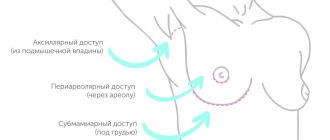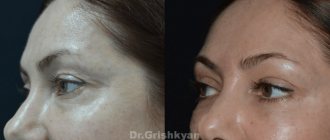The decision to undergo breast augmentation surgery is a responsible and serious action that requires an appropriate attitude from a woman. It is necessary not only to weigh all the pros and cons of such an operation, but also to choose the optimal time for mammoplasty.
It's no secret that a woman's body undergoes changes during the menstrual cycle that can affect the course of any operation, including breast augmentation surgery. It follows from this that before carrying out it, it is necessary to correctly determine the acceptable day for this.
Breast enlargement during menstruation
During menstruation, mammoplasty surgery is not recommended, this is due to changes in the functions of the woman’s body during this period:
- Deterioration of blood clotting.
- Increased sensitivity to many drugs.
- Increasing the duration of the rehabilitation period.
- Decreased immunity, including resistance to infectious diseases.
All these factors undoubtedly complicate the operation and can lead to postoperative difficulties.
Why you can't have surgery during your period
What does a woman risk if she finds herself on the operating table on one of her critical days, and is it possible to have surgery during her period?
- Possibility of sudden bleeding. A serious complication can occur due to the fact that blood clots more slowly during menstruation. This is fraught with rapid blood loss, subsequent hematomas at the site of the intervention. This situation is especially dangerous for those who suffer from iron deficiency anemia. Significant blood loss in this case poses a real threat to life.
- Unpredictable reaction to anesthesia. Although menstruation is not an absolute contraindication to general anesthesia, anesthesiologists try to avoid administering drugs during menstruation. Due to the action of hormones, the reaction to medications changes and the pain threshold decreases. Calculating the individual optimal dose of anesthetic agent becomes difficult. If there is an error, the body may not respond properly or, conversely, the reaction will be excessive.
- Formation of hematomas, age spots and rough postoperative scars. Due to increased blood flow in the tissues, any injury can cause hematomas, in place of which pigment spots often form. Both disappear within a few months. The reason for the formation of keloid scars at the site of excision of skin and muscles is a violation of collagen metabolism in tissues. Fortunately, such scars are amenable to cosmetic surgery, which can make them less noticeable.
- The risk of infection and decay of postoperative wounds increases. During menstruation, immunity decreases, so resistance to infections is lower than usual. Increased blood supply to the operated area contributes to the development of inflammatory processes. Surgery and menstruation
are also incompatible for this reason. - Complications caused by mental state. One should not discount the fact that critical days are often accompanied by increased emotionality and irritability. The stress caused by the operation makes the mental state even more unstable. The body may respond with an inadequate reaction to anesthesia and other medications, increased blood pressure and abnormal heart rhythm.
- Long rehabilitation. With any operation performed during menstruation, blood loss will be greater. This will lead to a decrease in the number of red blood cells and a decrease in hemoglobin levels. As a result, the recovery period will be delayed.
Delayed breast enlargement
Slight deviations from the onset of menstruation are a normal phenomenon that every woman has experienced at least once in her life. However, this is not always associated with a cycle disorder; in some cases, the cause is a remarkable phenomenon - pregnancy. Undoubtedly, the birth of a new life is a miracle for any woman, but it is a contraindication for many operations, and mammoplasty is no exception. Therefore, if menstruation is delayed, before surgery it is necessary to make sure that the cause is not pregnancy.
From the above facts, we can conclude that the most optimal time for mammoplasty may be the period between the end of menstruation and the beginning of ovulation, when the woman’s body is protected from surrounding harmful factors, and complications are least likely.
What tests are needed for mammoplasty?
- Within 1-2 weeks before the operation, the patient will need to undergo a series of tests that will identify a number of indicators that directly affect the technique of execution, the effect of the intervention, and also help ensure that there are no contraindications: General blood count. Required to detect the presence of infections in the acute stage, blood diseases. In addition, it can be used to determine the Rh factor group.
- Blood chemistry. Indicators such as the level of glucose, bilirubin, hemoglobin, various cells (erythrocytes, leukocytes), proteins, amino acids, inorganic substances and trace elements are checked. Deviations from the norm increase the likelihood of complications, the risk of inflammation during healing and other unpleasant consequences.
- Testing for the presence of certain diseases using special markers. The list includes: HIV, syphilis, hepatitis B and C.
- Study of hormonal levels. The level of a woman's sex hormones is determined.
- Pregnancy test. If the result is positive, the operation is postponed for up to six months after the birth of the child.
Answers to questions about plastic surgery
How long does swelling last after rhinoplasty?
Swelling after primary rhinoplasty lasts from 3 to 6 months, after secondary rhinoplasty it is therefore 3-4 months longer, it all depends on the volume of surgical intervention and the individual characteristics of the body, as well as the recommendations followed.
Is it possible to smoke before surgery?
I strongly do not recommend smoking on the eve of surgery; the nicotine contained in cigarettes causes negative effects on the body, in particular it can adversely affect the cardiovascular and respiratory systems during the period of general anesthesia.
At what age do you have to have rhinoplasty?
All plastic surgeries can be performed from the age of 18, the only exception being otoplasty, which can be performed from the age of 6.
Is rhinoplasty during menstruation acceptable?
Yes, at present, critical days are not contraindications for surgery.
Rhinoplasty - does it hurt?
You will not feel any pain, there is only discomfort when breathing, immediately after the operation, tampons with a medicinal preparation are inserted into the nasal passages for a day, so you need to prepare yourself that you will have to breathe only through your mouth all day, the next day I remove them, and only a small amount remains nasal congestion due to postoperative swelling. Typically, painkillers are not required after this operation.
What happens to excess skin after liposuction?
The skin gradually shrinks, although its quality is good. I always recommend taking a course of lpg massage after this operation. Then the swelling goes away faster and more evenly and, accordingly, the skin contracts better.
Is pregnancy safe after abdominoplasty (tummy tuck)?
Yes, of course, abdominoplasty is not a contraindication to pregnancy, it is only a matter of time, the main thing is that at least 8-9 months have passed after the operation.
Does a breast lift change its size?
It all depends on the type of lift, as a rule, the size is reduced by 1-2 units, but if this is problematic, I offer my patients a lift with implants for a stable result and a beautiful breast shape.
Can endoprosthetics correct sagging breasts? Everything again depends on individual characteristics; if there is a small breast shape and ptosis, the changes can be corrected with the help of correctly selected implants.
What medications should you stop taking before surgery?
As a rule, these are medications that affect blood clotting (drugs containing acetylsalicylic acid (aspirin), hormonal drugs, NSAIDs, diuretics, muscle relaxants, antidepressants)
Is it possible to have breast augmentation before giving birth?
Breast enlargement is not a contraindication to subsequent lactation. The implant is installed under the pectoralis major muscle; the gland itself is not affected or injured, which should not subsequently affect lactation.
Do silicone prostheses have an adverse effect on the developing fetus? No, it has now been proven that implants are made of absolutely safe material both for the woman’s body and for the developing fetus.
What is capsular contracture?
Capsular contracture is a complication that can occur after breast replacement; it consists of the formation of a dense fibrous capsule around the implant, which causes gradual deformation of the implant and may be accompanied by pain.
Does nipple sensitivity decrease after surgery?
This is possible immediately after surgery, but within 3 to 6 months sensitivity is completely restored.
How long after surgery can I fly on airplanes?
Immediately after discharge, flights do not affect the postoperative period in any way.
How soon can you sunbathe?
I recommend sunbathing no earlier than a month after surgery. It is advisable to avoid direct sunlight on the sites of postoperative scars.
Tell me, is it true that at the end of the rehabilitation period after breast augmentation, you can walk without supporting underwear for the first 2-3 months? Or, after a month after the operation, can you walk around without underwear all the time?
For the first month I recommend wearing compression underwear, the next 2 months you can wear underwear that is comfortable for you, the main thing is that the underwear is without wires.
Please tell me whether drainage is installed during mammoplasty, do sutures need to be removed or is glue used? Is your department equipped with intensive care? (tricky question these days)
During breast operations, I do not place drains, drains are an entry point for infections, and it is better to prevent complications than to treat them, but each doctor has his own opinion on this matter. Yes, of course, we have intensive care)
If I live in a foreign country, is it possible for me to take all the necessary tests at your clinic? Yes, of course, preoperative examination usually takes 1-2 days
I am planning a breast augmentation. In what period of time will I be able to return to work? I work as a lawyer (trips in a car, a lot of time in a sitting position, computer).
I recommend just resting at home for 1 week, if your work does not involve physical labor, then after a week you can safely start working everyday life. As for driving a car, I recommend not driving for 2 weeks.
Mammoplasty: preparation tips
For the correction to be successful, doctors recommend adhering to some of the recommendations listed below. Compliance with them will help reduce the risk of complications, facilitate post-operative recovery and allow it to be completed faster.
- 1-2 weeks before the operation, stop taking medications: a) containing aspirin; b) anti-inflammatory; c) hormonal contraceptives; d) vitamins, if the doctor recommends eliminating them.
- During the month before mammoplasty and for the entire rehabilitation period, give up alcohol and nicotine. This is caused by a negative effect on the circulatory system, blood vessels, and heart. Drinking alcoholic beverages and smoking slow down the processes of regeneration and metabolism and prevent the access of drugs to tissues.
- Follow a light diet. It is worth excluding from the diet fatty, spicy and sweet foods that provoke digestive and gastrointestinal disorders.
- Avoid strenuous physical activity. It is especially important to adhere to this prescription after surgery, when excessive physical activity can aggravate the recovery process.
- Normalize your daily routine, avoid worries and anxiety. It is recommended to get more rest.
By contacting Dr. Panov’s Clinic, you can rest assured about the results. We will undertake all the tests for mammoplasty, and during consultations, our highly experienced professional plastic surgeons will explain in detail all the nuances of the operation. With us, your dream of beautiful breasts will come true!









